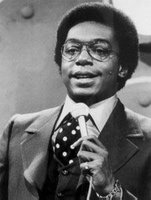
The following appeared in The Chicago Sun-Times…
---------------------------------------------
Ever-cool Cornelius keeps ‘Soul Train’ rolling
March 17, 2006
BY LYNN ELBER
LOS ANGELES -- If any businessman can lay claim to soul, it’s Don Cornelius.
It’s in the baritone rumble of his ex-disc jockey’s voice, his coolly unflappable manner and, most of all, in his “Soul Train” franchise that brought a slice of black culture and music to the snow-white TV landscape more than three decades ago.
Even in the midst of mild chaos, while the staff at his Sunset Boulevard office scurried to finish plans for this year’s “Soul Train Music Awards,” Cornelius looked and sounded relaxed.
But if his tone didn’t reflect excitement over the 20th anniversary ceremony, his words did.
“We can’t make it important to anybody else,” Cornelius said. “Some of the audience we serve doesn’t really care about what you did yesterday and you have to be cognizant of that. ... But it’s important to us.”
The ceremony, taped March 4 and airing at 7 p.m. Saturday on WGN-Channel 9 with hosts Vivica A. Fox and Tyrese Gibson, celebrates the work of artists in R&B, hip-hop and gospel.
Performers include the Black Eyed Peas (who also are among the leading nominees), Charlie Wilson, John Legend and Chris Brown. R. Kelly, Mariah Carey, Kanye West and Gwen Stefani are among the nominees.
Jamie Foxx and Destiny’s Child were recipients of the Quincy Jones Award for Outstanding Career Achievement, while Legend received the Sammy Davis Jr. Award. A new award for songwriting, named in honor of Stevie Wonder, was presented to Kelly by the legendary singer-songwriter.
“We just seem to be surrounded on this anniversary show by all of our personal favorites,” Cornelius said. “I have to say that in the first person, because they’re my personal favorites.”
Using first-person singular is rare for Cornelius, who tends to prefer “we” when he’s referring to himself and his achievements. It’s a verbal tick that comes off more protective than pretentious, especially in light of his cautious approach to an interview.
Although it took years for major advertisers, including Coca-Cola and McDonald’s, to board “Soul Train” after the black version of “American Bandstand” debuted, Cornelius declines to criticize their slowness.
Major companies weren’t “big fans of syndication,” he said, rejecting the idea that racial bias might have been involved. (He doesn’t shy away from calling out discrimination when it's “hard-core” and malicious, he said.)
He’d like to see more support from record companies and Madison Avenue for his awards show, but again is measured in his remarks. “It could be stronger” but expectations have to be “realistic,” he said.
Cornelius, 69, is far more direct when he talks about the start of “Soul Train” on Chicago TV station WCIU in 1970. It went into syndication the following year.
“There was not programming that targeted any particular ethnicity,” he said, then added: “I’m trying to use euphemisms here, trying to avoid saying there was no television for black folks, which they knew was for them.”
“Soul Train,” with its trademark animated train opening, chugged gradually onto TV screens nationwide: Only a handful of stations initially were receptive to the newcomer. Johnson Products Co., maker of Afro Sheen and other hair-care goods, was its major sponsor.
“When we rolled it out, there were only eight takers,” he recalled. “Which was somewhere between a little disappointing and a whole lot disappointing.”
The reasons he heard?
“There was just, ‘We don't want it. We pass,’” he said, with race going unmentioned. “No one was blatant enough to say that.”
Audience reaction to the show and the high-powered talent it attracted helped it spread; “Soul Train,” now the longest-running show in first-run syndication (as opposed to network repeats), reaches 85 percent of TV markets.
Besides the series and the “Soul Train Music Awards,” the brand includes the “Soul Train Lady of Soul Awards” and the “Soul Train Christmas Starfest.” Cornelius, who remains executive producer but stepped down as “Soul Train” host in 1993 (Dorian Gregory has the job now), toyed with the idea of a Soul Train cable channel.
“We came to the conclusion that we came along a little late to make it happen. There’s also the problem of whether or not I had the energy to start something of that magnitude from scratch,” he said.
Besides, Cornelius said, the Internet can reach a mass audience without the hassle of building a cable channel from scratch. He drops intriguing hints that his never-released treasure trove of “Soul Train” tapes could, theoretically, end up online.
Among the many legendary artists on the tapes: Aretha Franklin, Marvin Gaye and Barry White. Filmmaker Spike Lee called the collection “an urban music time capsule,” Cornelius said.
The tapes are jealously guarded by Cornelius, who refuses to say if or how the public might get a peek at them.
AP
Copyright © The Sun-Times Company. All rights reserved.

No comments:
Post a Comment